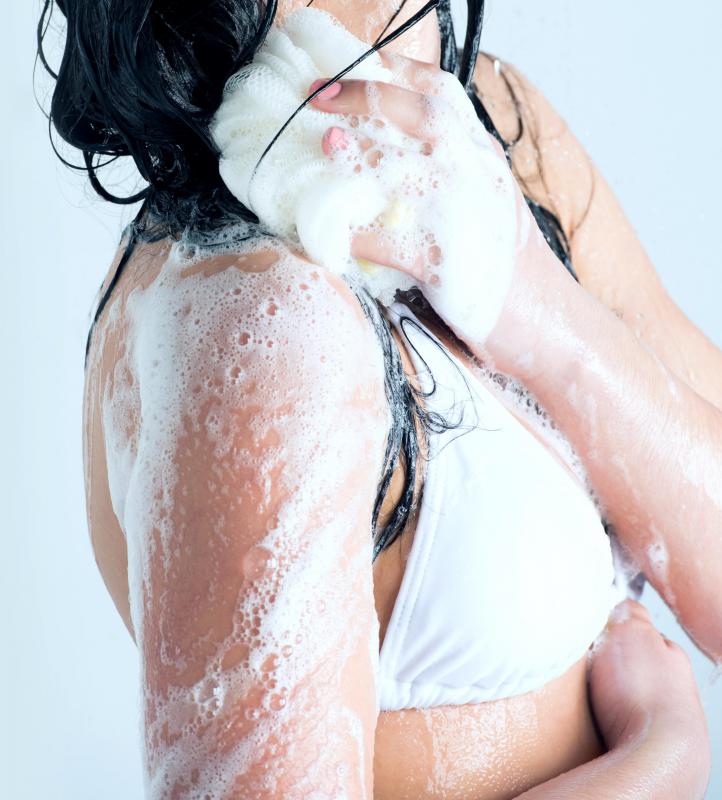At WiseGEEK, we're committed to delivering accurate, trustworthy information. Our expert-authored content is rigorously fact-checked and sourced from credible authorities. Discover how we uphold the highest standards in providing you with reliable knowledge.
What is Black Soap?
Black soap is a cleansing soap that has been made in Africa for centuries. It is made from the ashes of the burned leaves and bark of several plants and trees, including plantain, banana, palm and shea. Most black soap is made in western Africa, where the recipes are well-kept tribal and community secrets. It is made in other parts of the world, too, but black soap made outside of Africa usually contains artificial ingredients not found in true African black soap.
There are two kinds of true black soap, which are made in Nigeria and Ghana. The variety made in Ghana is called alata samina, and the Nigerian soap is called ose dudu. They are similar, with differences based largely on the availability of ingredients in the area. Both types of black soap are extremely gentle, mild, and recommended for those with very sensitive skin. In the areas of Africa where this hypoallergenic soap is made, it is even used on newborn babies.

To make black soap, leaves and bark are gathered by African women and left in the sun to dry for days. After drying, they are combined with oils and water and cooked in a large pot over an open fire for at least a day. In some areas, essential oils or extracts are added to give the soap a pleasant scent, because the unscented soap has an earthy odor. Honey, aloe or oats also may be added to give the soap additional soothing and healing properties. The soap mixture is left to cure for about two weeks after cooking; it is then molded into bars or balls and stored in a dry place.

This all-natural African soap is said to improve a variety of skin conditions. It is used to treat acne, psoriasis and eczema, as well as a variety of fungal infections. Black soap may lessen wrinkles, shrink large pores and lighten dark spots. Small pieces of leaves that remain in the soap after cooking help to exfoliate the skin, leaving it smooth and deeply clean.

Black soap also is made into a shampoo to treat dandruff and dry scalp. When it is made with shea butter, it coats the hair with a protective layer that repairs and conditions the hair and protects it from the damaging rays of the sun. A tiny piece of this bar soap goes a long way, and it should be lathered up before putting it into the hair.
This inexpensive soap should be purchased from a reputable organization that uses fair trade practices to ensure that the women who labored to make the soap are paid a fair price. Purchasing from a reputable organization also helps to ensure that a person is buying true black soap, not one of the many imitations on the market that are made with completely different, not always natural, ingredients.
AS FEATURED ON:
AS FEATURED ON:















Discussion Comments
@bythewell - I'm sure it's a great soap, but I'm not sure that it's miraculous. Most of the time that sort of hype just happens because it's the best product available in a particular place, but that doesn't mean it's going to be better than products you can find elsewhere.
I like the idea of buying from communities that might need the money, but I think exporting soap might not be the best way for them to improve their circumstances.
@umbra21 - I imagine that the traditional black soap relies somewhat on the fact that it is made with charcoal, but mostly it would be about the type of charcoal and other ingredients that would make it such a miraculous cure. If you really wanted to try African black soap you'd need to get it from a source that can find it from the original communities.
It sounds like it would be worth paying extra for it, as it has a lot of uses and hopefully it would mean extra money going to communities that need it as well.
I have used black soap before, but it wasn't this kind of genuine soap from indigenous communities. I didn't actually realize that was the origin of this type of soap.
It was a natural kind of soap, using charcoal as a major ingredient, because it's supposed to be able to absorb oil and mildly exfoliate the skin.
Post your comments